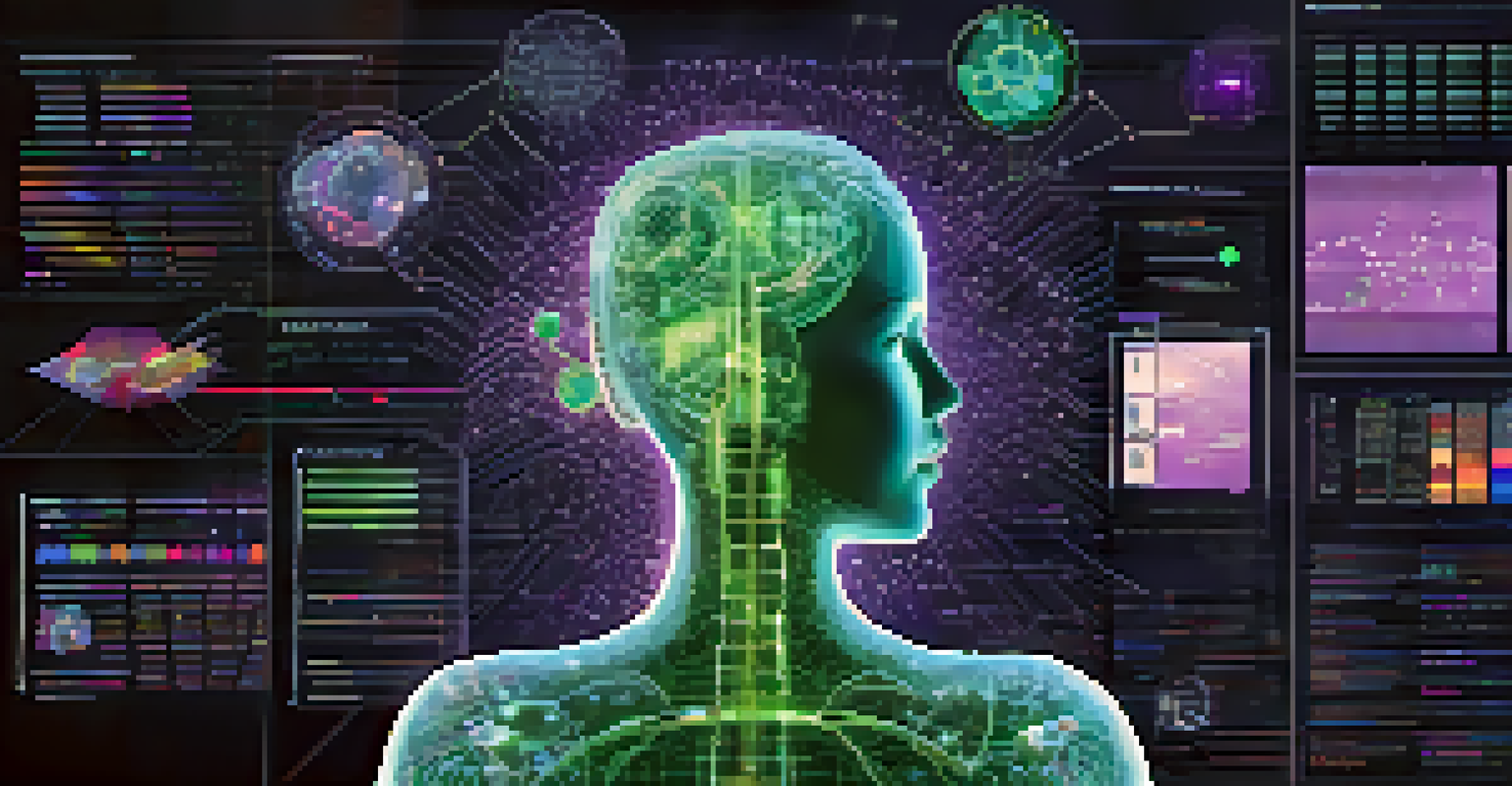AI in Healthcare: Enhancing Diagnosis and Treatment Plans

Understanding AI's Role in Healthcare Innovations
Artificial Intelligence (AI) is making significant waves in the healthcare sector, transforming how we approach diagnosis and treatment. By harnessing data and algorithms, AI systems can analyze vast amounts of medical information quickly and accurately. This technology is helping clinicians make better-informed decisions, ultimately leading to improved patient outcomes.
The greatest benefit of AI in healthcare is its ability to analyze vast amounts of data quickly and accurately, leading to better patient outcomes.
Imagine having a highly skilled assistant that can sift through thousands of medical records in seconds to find patterns that a human might miss. This capability not only saves time but also enhances the accuracy of diagnoses. With AI, healthcare professionals can focus more on patient care rather than getting bogged down by administrative tasks.
As we continue to explore AI's potential, it's clear that this technology is not just a trend; it's reshaping the future of healthcare. From predictive analytics to personalized medicine, the possibilities are vast, ushering in an era where patient care is more precise and efficient.
AI Algorithms: The Backbone of Enhanced Diagnostics
At the heart of AI's impact on healthcare are sophisticated algorithms that analyze data like never before. These algorithms can identify diseases at early stages, often before symptoms appear, significantly improving treatment effectiveness. For instance, AI systems are being used in radiology to detect abnormalities in imaging tests that radiologists might overlook.

Consider this: a machine learning algorithm trained on thousands of chest X-rays can learn to recognize patterns associated with conditions like pneumonia or tumors. This not only supports radiologists in their assessments but also reduces the chances of human error. With AI's assistance, the diagnostic process becomes more robust and reliable.
AI Enhances Healthcare Diagnostics
AI algorithms can identify diseases at early stages, improving treatment effectiveness and reducing human error.
As these algorithms continue to evolve, they are also becoming more adept at learning from new data. This continuous learning process allows them to adapt to emerging health trends, ensuring that healthcare professionals have the most current information at their disposal.
Personalized Treatment Plans Powered by AI
One of the most exciting advancements in AI is its ability to create personalized treatment plans tailored to individual patients. By analyzing genetic information, medical history, and lifestyle factors, AI can recommend therapies that are most likely to be effective for specific individuals. This personalized approach contrasts sharply with the traditional 'one-size-fits-all' model.
AI will fundamentally change the way we approach medicine, allowing for personalized treatment plans that cater to individual patient needs.
For example, in oncology, AI can help identify which cancer treatments may work best based on a patient's unique genetic makeup. This not only increases the likelihood of successful outcomes but also minimizes the side effects associated with ineffective treatments. Patients can feel more empowered and engaged in their healthcare journey.
As more data becomes available, the potential for AI to refine these treatment plans grows. This dynamic adaptation ensures that healthcare remains responsive to the ever-changing landscape of patient needs and medical advancements.
AI in Predictive Analytics for Patient Care
Predictive analytics, powered by AI, is revolutionizing how healthcare providers anticipate patient needs. By examining historical data, these systems can forecast potential health issues before they escalate. For example, AI can identify patients at risk of developing chronic diseases, enabling proactive interventions.
Imagine a healthcare provider receiving alerts about patients who may need additional support or monitoring due to their predictive scores. This foresight allows for timely interventions, often leading to better health outcomes and reduced healthcare costs. It’s like having a crystal ball that helps providers stay one step ahead.
Personalized Treatments Through AI
AI analyzes individual patient data to create tailored treatment plans, increasing the likelihood of successful outcomes.
The integration of predictive analytics not only improves individual care but also enhances overall population health management. By addressing risks early, healthcare systems can allocate resources more effectively and promote healthier communities.
Streamlining Administrative Tasks with AI
In addition to clinical applications, AI is also streamlining administrative tasks within healthcare organizations. Tasks such as scheduling appointments, managing billing, and processing insurance claims can be automated, freeing up valuable time for healthcare professionals. This efficiency translates to improved patient experiences and less burnout among staff.
For instance, AI-driven chatbots can handle routine inquiries from patients, allowing them to get information quickly without tying up staff resources. This not only enhances patient satisfaction but also allows healthcare workers to focus on more complex inquiries that require human expertise.
As administrative burdens decrease, healthcare providers can dedicate more time to patient care. This shift not only benefits healthcare professionals but also fosters a more humane and compassionate healthcare environment for patients.
AI's Contribution to Medical Research Advancements
AI is playing a crucial role in accelerating medical research, enabling scientists to analyze vast datasets more efficiently. Researchers can uncover trends, test hypotheses, and validate findings at speeds previously unimaginable. This capability is particularly beneficial in the context of drug discovery and development.
For example, AI algorithms can analyze the chemical properties of potential drug candidates and predict their effectiveness against specific diseases. This significantly reduces the time and resources required for traditional research methods, ultimately bringing new treatments to market faster.
AI Streamlines Healthcare Administration
AI automates administrative tasks, allowing healthcare professionals to focus more on patient care and improving overall efficiency.
By harnessing AI's analytical power, researchers can focus on innovative solutions to pressing health challenges, paving the way for breakthroughs that may have taken years to achieve otherwise.
Challenges and Ethical Considerations of AI in Healthcare
While the benefits of AI in healthcare are substantial, it's important to address the challenges and ethical considerations that come with it. Issues such as data privacy, algorithmic bias, and the need for transparency are paramount. Ensuring that AI systems are fair and equitable is crucial for maintaining trust in healthcare.
For instance, if an AI system is trained on biased data, it may produce skewed results that could adversely affect certain populations. This highlights the importance of diverse datasets and rigorous testing to ensure that AI applications serve all patients fairly and effectively.

As we navigate the integration of AI into healthcare, ongoing dialogue about ethical practices and regulatory frameworks will be essential. By proactively addressing these challenges, we can harness AI's potential while safeguarding the rights and wellbeing of patients.
The Future of AI in Healthcare: A Collaborative Approach
Looking ahead, the future of AI in healthcare appears bright and collaborative. As technology continues to advance, the partnership between AI systems and healthcare providers will deepen. This collaboration will enhance not only diagnostic accuracy and treatment efficacy but also patient engagement and satisfaction.
Imagine a future where AI tools work hand-in-hand with doctors, providing real-time insights during patient consultations. This synergy can empower healthcare professionals to make informed decisions swiftly, ultimately benefiting patients. It's a partnership that respects the human touch while leveraging the power of technology.
As we embrace this future, continuous education and adaptation will be key. By combining human expertise with AI capabilities, we can create a healthcare landscape that is more responsive, efficient, and compassionate.